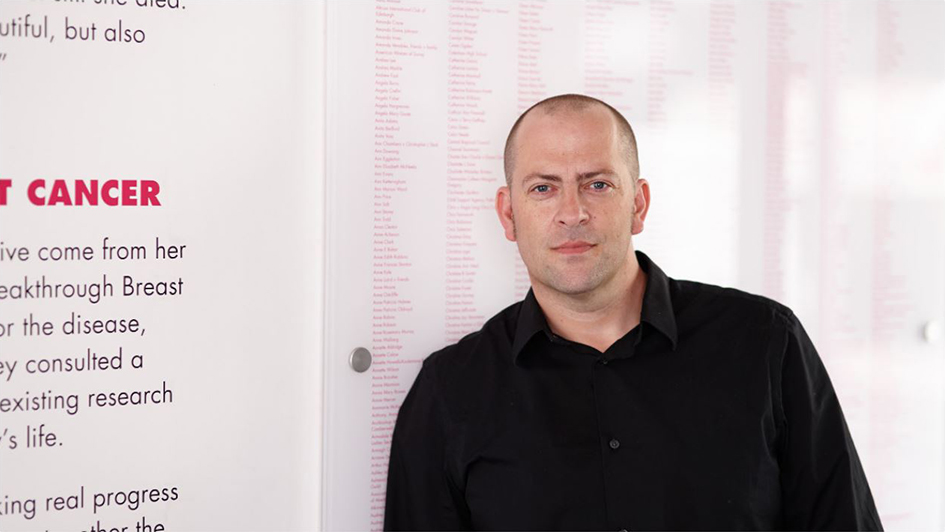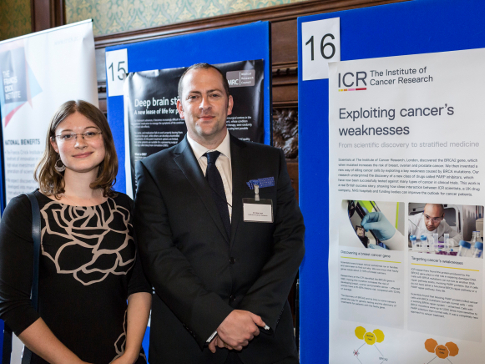
“Chris is a great talent, and he has had an enormous impact on cancer research,” said Professor Andrew Tutt, Head of the Division of Breast Cancer Research, as he introduced his colleague of nearly 20 years on the day he marked his promotion to Professor.
It is hard to argue with that assessment. Professor Chris Lord joined the ICR to work in the team of Professor Alan Ashworth – former Chief Executive of the ICR – shortly after Alan helped discover the gene BRCA2, which can greatly increase the risk of breast cancer when mutated.
Chris later helped to show that PARP inhibitors, such as olaparib, can selectively target cells with these BRCA2 mutations.
Today, as leader of the ICR’s Gene Function Team, Professor Lord continues to investigate the genetic basis of breast cancer as a means to understand and treat the disease.
Early years
In his talk, ‘Riding the rough seas of synthetic lethality’, Professor Lord shared an overview of his research career, which has positioned him as an expert in the field of synthetic lethality.
Synthetic lethality is a term that first emerged in the 1940s, but took on new relevance in the 2000s thanks to ICR research into the BRCA1 and BRCA2 genes.
It occurs when disrupting the activity of two genes, through mutations or targeted drugs, is fatal to a cell, even though either disruption alone would not be.
This idea has formed the basis of much of Professor Lord’s work at the ICR as, in the years following our BRCA2 gene discovery, he helped to look for ways to translate this research into benefits for patients.
He said: “Around 85 per cent of women with mutations in their BRCA2 or BRCA1 genes will go on to develop breast cancer. The discovery of these genes allowed women who were at high risk to have preventative surgery to reduce it.
“But it didn’t tell us how to treat the disease in women who already had breast cancer.
So we began to search for drugs that would selectively kill BRCA2 or BRCA1-defective cells.”
Work on olaparib
The team soon realised that the role of the BRCA1 and BRCA2 genes in DNA damage repair held the key. Cancer cells with BRCA-gene mutations were more reliant on a second method of repairing their DNA that required the protein PARP, making them vulnerable to synthetic lethality.
Working with a company called KuDOS, which was developing drugs to target PARP, they showed that these drugs could selectively kill cells with BRCA-gene mutations, leaving healthy cells alone.
The team later worked with The Royal Marsden NHS Foundation Trust and researchers including Professors Andrew Tutt, Johann de Bono and Stan Kaye Stan Kaye on trials of the PARP inhibitor olaparib, which is now approved by the US Food and Drug Administration for patients with advanced ovarian and breast cancer, and has been given to more than 20,000 patients worldwide.
It’s available on the NHS to treat some women with BRCA-gene mutant ovarian cancer.
Next steps
Unfortunately, as with many other treatments, it is common for cancer cells to eventually develop resistance to PARP inhibitors. Professor Lord and his team have worked hard to understand how this occurs and how it can be combatted.
Earlier this year, they discovered a series of PARP1 mutations that helps cells become resistant to olaparib. The discovery could make it possible to test patients for the mutation, allowing doctors to judge whether and for how long the drug should be used.
Professor Lord is also hopeful that more cancers could be targeted in the same way as BRCA-mutant breast cancer.
He said: “After more than 10 years of effort, we still have just a few targets for synthetic lethality. That’s why we’re looking for new ways to identify synthetic lethal effects linked to other cancer-causing mutations.
“I think there’s never been a better time for studying synthetic lethality in cancer.”
Proud and humbled
At the end of his lecture, Professor Lord thanked the ICR and his colleagues for the last two decades.
He said: "Becoming a professor at the ICR is a big thing for me, and I’m very proud and humbled to be here today.
“The ICR is a special place. Many institutions talk about translational research, but we do it. We do impactful research that makes it into the clinic. We uncover new biology that leads to drug discovery and clinical trials, and we run clinical trials that feed back into our understanding of biology.
“Most scientists will tell you they want to make a difference – here you can do that.”
“Finally, none of what we do as scientists we do alone, so I want to thank my lab for all their hard work, and my wife and daughter for all their incredible support. I couldn’t have done it without them.”
